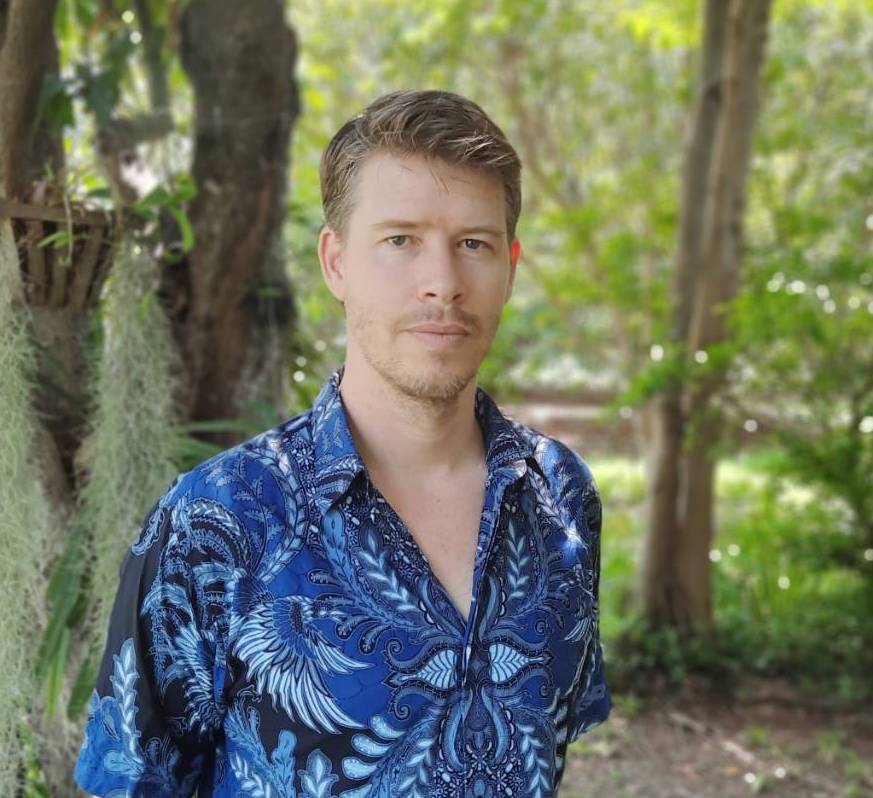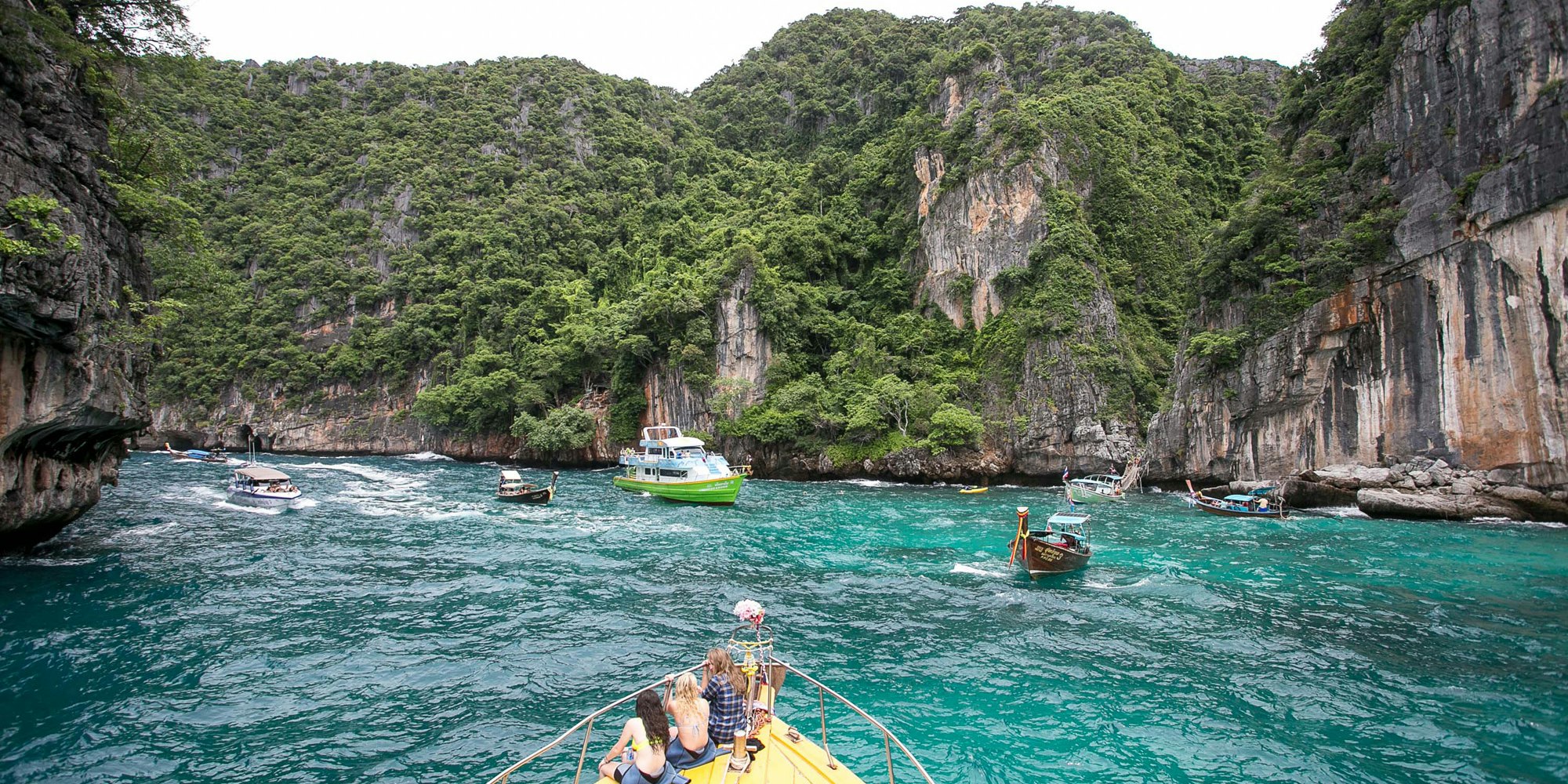

Future Travel Dates Coming Soon
| Find out when future dates are available |
Are you ready to experience the ultimate adventure in Thailand?
Imagine trekking through the misty green mountains of northern Thailand and feeling the earth tremble beneath your feet as you walk with majestic elephants. Get lost in the intoxicating smell of nature and gaze into the wise and knowing eyes of these gentle giants. Swim in crystal clear waterfalls, navigate down rivers on thrilling rafting trips and immerse yourself in the vibrant culture of Thailand.
The thrilling adventures continue as you make your way to the beautiful southern islands of Thailand. Climb towering limestone cliffs, snorkel in the sparkling waters and relax on some of the world’s most stunning beaches. Embrace the local customs and traditions as you become a part of the rich history of this country. You’ll feel a sense of fulfillment and satisfaction like never before.
You’ll get to experience the best of Thailand and create memories that will last a lifetime.

In 2025, Rustic Pathways received GoAbroad’s Top Rated Provider recognition for high school travel in Thailand.
| Service projects support UN Sustainable Development Goals |
 |
Similar Programs Available Now

Thailand: Marine and Rainforest Conservation
Rich ecosystems & cultural immersion
Age 14-18
$4995 plus Airfare
-
-
Country:
-
-
-
Department:
- Student Travel
-
-
-
Duration:
- 19 Days
-
-
-
Ages:
- 14-18
-
-
-
Cost:
- $7,487 plus Airfare
-
-
-
Language Study Hours:
- 28
-
-
-
Program Types:
-
Here is a detailed packing list for your time in Southeast Asia this summer. Packing the right gear (and not too much of it) is the first step to an incredible travel experience. Remember that you’ll be responsible for carrying your belongings everywhere you go, so PACK LIGHT! If your bag weighs more than 35 pounds, you’ve overpacked!
Weather in Southeast Asia
Summer in Southeast Asia is known as the “rainy season” or the “green season”—days are generally hot and humid, with brief and refreshing showers that keep the land very lush and green. Temperatures sometimes cool off once the sun goes down, making for more pleasant evenings. Because of the heat, you’ll need to drink a lot more water than you’re used to drinking to stay hydrated! Your clothes should be able to get wet, dirty, and / or destroyed during service work and program activities.
Important Notes About Your Luggage
Airlines in Southeast Asia have weight restrictions for checked and carry-on luggage. Please limit your checked luggage to no more than 33lbs (15kg) and your carry-on luggage to 15lbs (7kg). For your one checked bag, a backpacking backpack or a duffel bag that is easy to carry are perfect. Make sure everything you pack in your carry-on bag complies with the carry-on regulations of the TSA. Lastly, remember to leave your valuables or prized possessions at home. It’s easier for things to get lost, stolen, or damaged while traveling.
Our Dress Code Expectations in Southeast Asia
Southeast Asian cultures are very conservative. Despite the hot climate, people in these parts of the world show less skin than in many Western cultures, and you’ll rarely see low-cut shirts or short shorts in rural communities. As we seek to respect and preserve the culture of the communities we work with, we ask that our students dress conservatively while in country. If you’re not wearing proper attire, we’ll ask you to change your clothes or abstain from the service project of the day.
To dress respectfully in Southeast Asia, please bring loose-fitting pants or shorts that cover just above the knees (think basketball length). Bring basic t-shirts that cover your shoulders, and please leave all tank tops, cut off shirts, low-cut, see-through, or crop tops at home. As mentioned in our packing lists, yoga pants and leggings are not appropriate because they are too form-fitting. The key is to show less skin and to stay cool by wearing loose-fitted clothing.
Temple Visits
Personal hygiene is important in Southeast Asia, so when visiting temples we want to clean up more than while doing service. Wearing modest, clean clothes that cover the knees and shoulders is a must, as per usual. Being respectful is the name of the game!
Laundry
We’ll find access about once a week. Laundry can be up to $10 – $20 per load.
A school backpack is ideal as it will be used for daily activities and outings.
- Passport!
- Photocopy of passport
- Visa documentation
- Consent to Travel form
- Rustic Pathways emergency contacts list
- Additional community service forms if needed
- Wallet / money / ATM card
- Pens and journal
- Book
- Phone
- Chargers
- Outlet power converter (for transit only! Thailand uses the same plugs as the USA–just make sure all electronics are compatible with 220v)
- Camera
- Earbuds / Ear plugs
- Reusable water bottle
- Sunglasses
- Medication
- One change of clothing
A 40-50 liter duffel bag or backpack is ideal.
Clothing
• 2-3 pairs of lightweight pants, jeans (too hot to wear often) or capris; leggings are not culturally appropriate as they are too form-fitting
• 4-5 pairs of long, loose-fitting shorts/skirts, which must go to the knees or longer. Used for service work where you want to keep cool, covered, and protected.
• 7-10 tops (t-shirts and sports shirts) – they can be cotton, or quick-dry shirts like capilene or polypropylene; tank tops are generally not acceptable unless for time at the pool or beach; keep in mind you’ll find cool t-shirts and other clothing at markets you’ll visit throughout the summer, which can supplement the tops you bring over
• 1-2 light, long sleeve t-shirts – breathable is best for the sun and certain areas of the region can get buggy or chilly (if you’re lucky!) at night
• 1 lightweight hoodie – most likely needed on flights, in movie theaters, or in airports. Most people will be fine without one
• 7-10 pairs of underwear – quick-dry material is best
• 4-7 pairs of socks – lightweight cotton or quick dry athletic socks are best
• 2 swimsuits – one piece swimsuits are appropriate, quick dry shorts you can swim in are also great. We also recommend a swimming shirt for coverage and sun protection. We’ll get a chance to get in the water frequently.
• 1 sarong / shawl / lightweight towel (not white!) – many accommodations will have towels for you to use, but it is handy to have something of your own for sitting poolside or visiting a waterfall
• A nice casual outfit – for special end of program dinners.
Important Items
• Flashlight or headlamp – rechargeable batteries are preferable
• Ultra-lightweight rainproof jacket – fear not if you don’t have one; ponchos are widely available and do a better job!
• Hat – for the sun
• Strappy sandals – like Tevas or Chacos
• Comfortable flip-flops or crocs – footwear that is easy to clean and easy to take on and off (you’ll be amazed at how often you’ll be taking your shoes off and on!); cheap flip-flops and crocs are widely available in Asia for a fraction of the cost
• Closed-toed athletic shoes – shoes that dry quickly, that you can hike short distances in and that protect your feet are best; shoes will get muddy and dirty, so don’t bring your favorite pair.
• A color photocopy of your passport
Toiletries
Most general toiletries are available throughout the region at a fraction of the cost. We suggest packing all items that could leak in a plastic or ziploc bag.
• Deodorant
• Shampoo and soap – you may want to bring biodegradable or natural soap and shampoo, but they’re not required
• Toothpaste and toothbrush
• Lip balm
• Insect repellent – we suggest a natural option or something with DEET
• Hydrocortisone/anti-itch cream or after bite
• Hand sanitizer – 1 small bottle; we don’t want you getting sick this summer!
• Contact lenses and solution
• Oxybenzone-free sunscreen (reef-safe) and aloe vera – good quality sunscreen is not readily available in Southeast Asia and is expensive!
• Feminine hygiene supplies – tampons aren’t widely available in Southeast Asia; past staff have suggested trying a diva cup; we recommend you bring what you think you will need for the duration of the program
Additional and Optional Items
• Local language phrasebook
• Deck of cards, portable games
• Digital camera – waterproof style shock resistant cameras are great for our programs; again, do not depend on your phone – we encourage our students to disconnect from their phones while on program.
• Pictures of family and friends
• Please cover your shoulders and knees while in Southeast Asia.
• Dressing respectfully is very important. Southeast Asian culture is conservative, with ancient customs based mostly on Buddhism. Regardless of gender, Rustic students should be wearing loose Bermuda or basketball length shorts or pants. Please leave short-shorts at home, as well as leggings, which are too form-fitting. T-shirts should cover the chest and shoulders, nothing low cut, and no undergarments should ever be showing.




